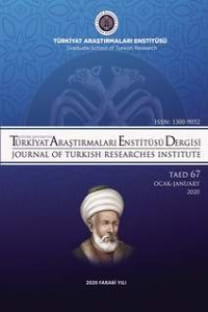THOMAS BERNHARD’IN NEDEN VE MAHZEN ADLI ESERLERİNDE MÜZİK MOTİFİ
Müzik kavramı, modern dünya toplumunda geniş kitlelere hitap eden ve birçok disiplinle etkileşim hâlinde olan bir sanat dalıdır. Bu disiplinler arasında edebiyat bilimiyle de etkileşim içinde olduğu söylenebilir. Bu çalışmada, Alman Edebiyatı’nın önemli yazarlarından biri olan Thomas Bernhard’ın otobiyografik nitelik taşıyan Neden ve Mahzen adlı iki eserinde müzik motifi incelenmiştir. Melankolik bir kaleme sahip olan Bernhard’ın bu iki eserinde müzik kavramı nasıl ele alınmış ve nasıl edebî bir motif hâline gelmiştir? Bu çalışma, bu gibi sorulara yanıt bulma amacıyla yürütülmüştür. Edebiyat bilimi ve müzik sanatının nasıl etkileşim içinde olduğunun bu iki eser aracılığıyla incelenmesi, çalışmamızın amacını oluşturur. Bu amaç doğrultusunda da, yazarın otobiyografik nitelik taşıyan Neden ve Mahzen adlı yapıtları esas alınmıştır.
Anahtar Kelimeler:
Thomas Bernhard, Otobiyografik Beşleme, Yalnızlık, Soyutlanmışlık, Müzik.
Music concept is a field of art, which appeals to large masses in the modern world‟s society and is in interaction with many disciplines. It can be said that from these disciplines, it is in interaction with the litarature science, too. In this study, music theme has been analysed in Thomas Bernhard‟s two literary works Neden and Mahzen having autobiographical features of him, who is one of the important autors in German Literature. How has music concept been analysed in these two works of Thomas Bernhard, who has a melancholic pen and how became this concept a literary theme? This study has been carried out to find answers to questions like these. Via these two works, analysing how literature science and the art of music are in interaction with each other has the purpose of this study. In line with this purpose, the literary works of the author Neden and Mahzen, which have autobiographical features, are based on.
___
Adorno, T. W. (1998). Introduction to the Sociology of Music. New York: Continuum Intl Pub Group.Adorno, T. W. (1997a). Musikalische Schriften I-III. Frankfurt am Main: Suhrkamp Verlag. Adorno, T. W. (1997b). Einleitung in die Musiksoziologie. Frankfurt am Main: Suhrkamp Verlag.
Aristoteles. (1975). Politika. (çev. Mete Tuncay). İstanbul: Remzi Kitabevi.
Bernhard, T. (2009). Die Autobiographie: Die Ursache, Der Keller, Der Atem, Die Kälte, Ein Kind. Auflage. Salzburg: Rezidenz Verlag.
Bernhard, T. (1993). Neden. (çev. Mustafa Tüzel). İstanbul: Mitos Boyut Yayınları
Bernhard, T. (1994). Mahzen. (çev. Mustafa Tüzel). İstanbul: Mitos Boyut Yayınları.
Fischer, E. (1995). Sanatın gerekliliği. (çev. Cevat Çapan). İstanbul: De Yayınları.
Gide, A. (2009). Pastoral Senfoni. (çev. Buket Yılmaz). İstanbul: Timaş Yayınları.
Hesse, H. (2012). Gertrud. (çev. Kamuran Şipal). İstanbul: Yapıkredi Yayınları.
Huizinga, J. (1971). Homo Ludens: A Study of the Play Element in Culture. (İng.Çev. George Steiner). London: Paladin.
Kayıkçı, M. (2007). Adorno‟nun Kültür Endüstrisi Kavramı Üzerine. Bilim, Eğitim ve Düşünce Dergisi. Haziran 7(2), 1-4.
Oskay, Ü. (2001). Müzik ve Yabancılaşma. İstanbul: Der Yayınları.
Özsan, S. (2006). Müzik ve Edebiyat Disiplinlerinin Etkileşimi. Mavi Nota Günlük E-Müzik Gazetesi. Yıl. 8, Sayı. 1525
Sarı, A. (2007). Thomas Bernhard’ın Şiir Dünyası. Ankara: De Ki Basım Yayım.
Werner-Jensen A. (2008). Geschichte der Musik. Mainz: Schott Music GmbH&Co. KG.
İnternet Kaynakları http://www.yeniodev.com/muzigin-edebiyatla-iliskisi.html (02.02.2013). http://www.hayatnotu.com/muzik-nasil-dogmustur-ve-ortaya-cikmistir.html (17.01.2013). http://tr.wikipedia.org/wiki/Klasik_T%C3%BCrk_m%C3%BCzi%C4%9Fi (09.12.2012). http://www.turkishmusicportal.org/history.php?id=9&lang2=tr (28.12.2012). http://www.univie.ac.at/iggerm/files/mitschriften/Literatur_und_Musik-2007WJanke.pdf (02013). http://entertainmentport.wordpress.com/2012/10/23/romantik-donemde-edebiyat-ve-muzikiliskisine-genel-bir-bakis/ (12.10.2012). http://mavimelek.com/edebiyat_klasik_muzik.htm (30.10.2012).
- ISSN: 1300-9052
- Yayın Aralığı: Yılda 3 Sayı
- Yayıncı: Atatürk Üniversitesi Türkiyat Araştırmaları Enstitüsü
Sayıdaki Diğer Makaleler
CEYHUN ATUF KANSU’NUN ŞİİR SANATI VE ŞİİRİNDE ÇOCUK
MEDHİYELERİN SİYÂSET-NÂME TÜRÜ AÇISINDAN DEĞERLENDİRİLMESİ
THOMAS BERNHARD’IN NEDEN VE MAHZEN ADLI ESERLERİNDE MÜZİK MOTİFİ
Adnan KÜÇÜKOĞLU, Adnan TAŞGIN, Akbar SAADNİE
DİVAN ŞAİRİNİN NİMET VE İKTİDAR EKSENİNDE ULUSLARI ÖTEKİLEŞTİRMESİ
